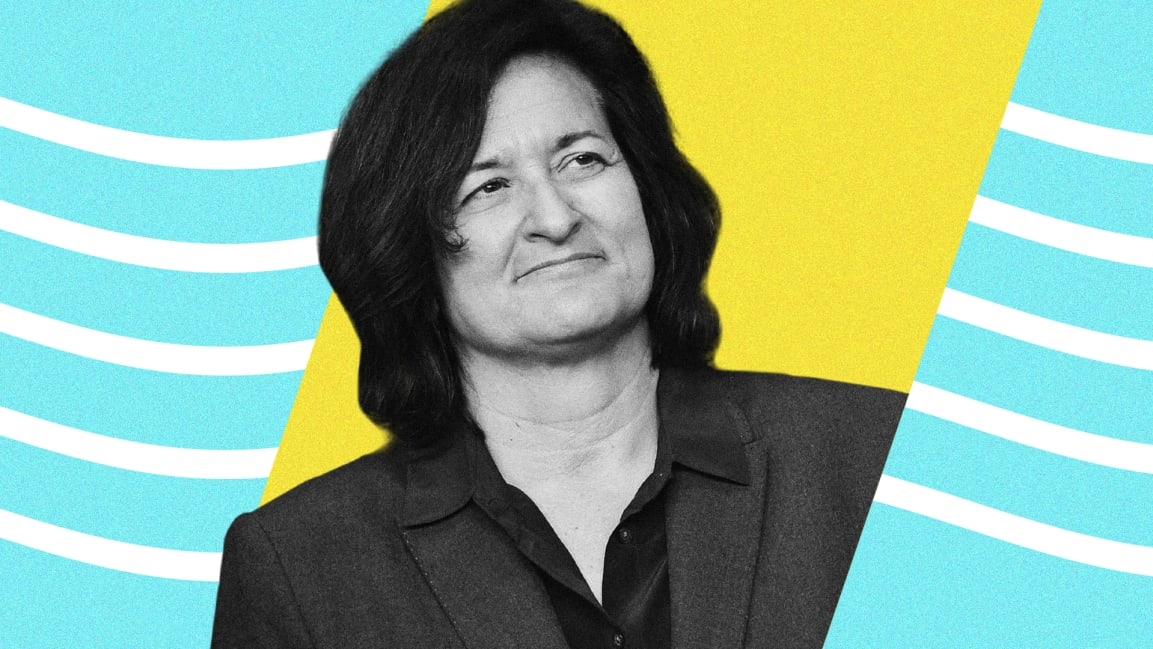Patagonia CEO Rose Marcario is stepping down
Patagonia CEO Rose Marcario is stepping down.
The outdoor retail brand announced the move internally on Wednesday afternoon. There is no immediate replacement, but chief operating officer Doug Freeman will be leading the transition until the privately held company’s board and founder Yvon Chouinard find a suitable successor.
In a statement to Fast Company, Marcario, who spent 12 years with the company and the last six as its top executive, said, “We have been planning my succession since late last year and believe now is the right time for the next-generation team to step in to reimagine the business for a bright future. Patagonia is in great hands, and on a path for 100 years of success.”
Chouinard said in a statement that Marcario has grown Patagonia’s advocacy efforts in ways he could never have imagined. “With Rose at the helm, we are leading an overdue revolution in agriculture, challenging this administration’s evil environmental rollbacks, growing a movement to increase voter participation in our elections and raising the bar on building our product in the most responsible manner possible.”
He added that he and Marcario had been discussing succession planning for some time, targeting a transition at the end of the year. “When this pandemic hit, and the focus quickly turned to reimagining the company for the future, Rose felt the team that would carry our work forward should lead this transformation,” he said.
Former Patagonia CEO and current board member Kris Tompkins says that Marcario has been “hands down” the best—and most impactful—CEO and leader in the history of the company. “And I can say that because I was the CEO for many years!” says Tompkins. “Rose took the activism ethos—the values of the family, the board, the team members—and took it to a whole new level.”
Tompkins says there is no set timeline to name a successor, and that the board and Chouinard family will be taking their time in choosing the right leader to succeed Marcario.
An impressive legacy
Marcario joined Patagonia as chief financial officer in 2008, and she stepped into a different company than the one you think of today. While the brand was iconic, its internal operations weren’t as strong as its image. Although the company had been founded on a commitment to grassroots environmental organizations, that part of the brand was often viewed, at least externally, as an appendage to the apparel business.
But Marcario brought a laser focus to her work, working quickly to review supply chains and streamline production, helping the company eliminate waste and excess packaging, develop new technologies such as recycled down and Yulex natural rubber wetsuits, and expand its Free Trade certified standards, all bringing the brand’s commitment to the environment even closer to its products.
Under her watch, the company established Tin Shed Ventures (in 2013) to fund small, environmentally responsible ventures that have helped it produce major strides in materials science as well as regenerative agriculture, leading to the expansion of Patagonia Provisions, its sustainable food offshoot. It also helped establish Worn Wear, an e-commerce market for used goods, focusing on reducing waste and extending the life of its gear. In 2018, the company launched Action Works, a digital platform that’s part social network, part recruiting tool aimed at connecting its customers with grassroots environmental organizations.
A leader for the 21st century
Marcario has been one of the world’s most distinctive and innovative chief executives. Her path to Patagonia was not what you’d expect. This was someone who had headed up M&A at a West Coast investment firm, then served as CFO at renowned Apple spinoff General Magic before moving into private equity.
As an advocate for a new kind of capitalism, she knew the system she was working to reform and used Patagonia as an instrument of change by continually proving that a commitment to the environment and sustainability could also be good for business. Since she joined Patagonia, it has quadrupled its sales and become a $1 billion company.
“I think reasonable people are understanding more that we’re using the resources of multiple planets, we can’t continue to consume the way we are, we can’t continue to have a vision of business that has one metric—earnings per share—it will kill us,” she told me in late 2017. “It will destroy our future. So we need business leaders who are smart and step up with a new vision for the future. It is happening all over the country and the world, and it’s exciting.”
When I asked former DanoneWave CEO Lorna Davis about Marcario for Fast Company’s Most Innovative Companies of 2018 issue, Davis told a story she said embodies what made Marcario special. “She said, ‘I went over to my products people and said, what do you think will be the biggest risk to your business in the next 30 years?‘ and then she went on to talk about soil health and made her point,” Davis said. “But if you think about that statement, you learn a lot about this woman. First of all, she spends a lot of time wandering over to her product people. Incredibly inclusive. She asks people a question about risk and about 30 years. She’s working on a 30-year framework. A businessperson asking one of their departments a 30-year question? There isn’t too much of that happening in the U.S. right now. She poses the right questions, getting her employees engaged in these big-picture issues, and creating context to inspire innovation.”
For every major impact she’s had on Patagonia’s internal business operations, she has also worked to build on the company’s activism—and how it talks about it publicly—to make sure everyone knows that the environment is not an appendage for the apparel company, but rather part of its spine. From investing in films such as DamNation (2014), Unbroken Ground (2016), and Artifishal (2019), among others, to switching its website to a stark black screen with the words “The President Stole Your Land,” in response to President Trump’s decision to roll back federal protection for Utah’s Bears Ears National Monument, Marcario made Patagonia’s activism central to its public-facing brand. In 2018, she donated the $10 million the company netted as a result of Trump’s corporate tax cut to environmental causes. For last year’s holiday season, Patagonia launched a campaign encouraging customers to donate to grassroots environmental organizations, matching their contributions up to $10 million.
Beyond messaging, Marcario led the company in joining a coalition of Native American and grassroots groups in suing the Trump administration over its public-lands policy and recently filed an amicus brief challenging the rollback of the Clean Power Plan. The 2018 midterm elections were also the first time that Patagonia openly endorsed candidates, helping Nevada senator Jacky Rosen and Senator Jon Tester of Montana win their seats.
Marcario was generally a behind-the-scenes leader, content to let Chouinard be the face of the company. But as the assault on the environment both accelerated and became more egregious under the Trump administration, Marcario became more vocal and more public. This included talking about being a lesbian, which made her one of the most prominent, if not the most high-profile, LGBTQIA CEOs. (Fast Company recently made her No. 1 on its inaugural Queer 50 list of the most influential LGBTQ women and nonbinary innovators in business and tech.)
“This isn’t the time to be lazy, to be reserved, to be complicit, to be quiet,” Marcario once told me. “We’re living in a time when it’s so important for business to drive this new economy, this new view, this aspirational future of business as a force for good. Because what we’ve seen in the last 25 years has been business as a force for evil.”
Tompkins says that the partnership between Chouinard and Marcario evolved over the years and created an extraordinary alchemy that pushed both of them in their thinking and their willingness to make audacious moves. It’s an alchemy that will not be easily replaced or replicated.
But both Tompkins and COO Doug Freeman say it’s a testament to Marcario’s legacy in how prepared the company is to move on without her.
“No matter what we’ve accomplished, we never get to the end,” says Freeman. “It’s all a process. We’re in a health crisis, we have social issues, the environment. Whether it’s goals looking ahead to 2025 or getting through this next year, we’re in good shape because of the quality Rose has left us with.”
(44)



